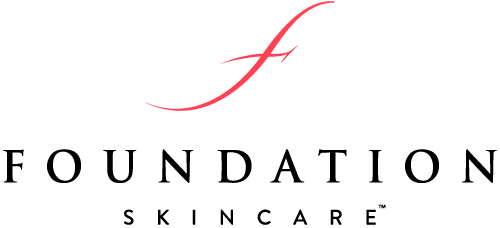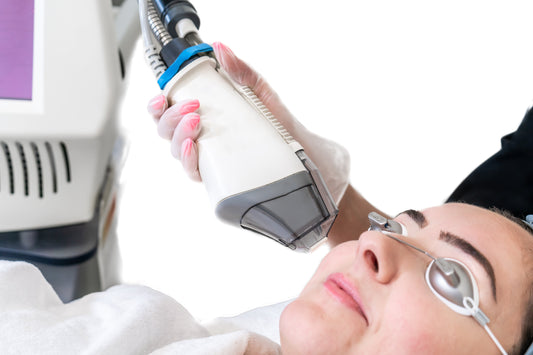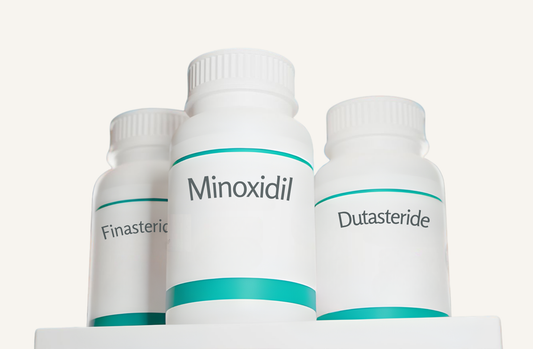Retinol is one of the most sought-after skincare ingredients, thanks to its impressive anti-aging benefits, as well as its ability to minimize acne.
If you’re wondering what skin type can use retinol (as well as what skin type shouldn’t use retinol), Dr. Anthony Nuara, MD PhD FAAD is here to help. He’s breaking down everything you should know about this highly effective skincare ingredient, as well as whether it deserves a spot in your skincare routine.
What is Retinol?
Retinol is the naturally occurring version of vitamin A that is found in meats and dairy, among other foods. It can also be obtained through the breakdown of carotenes from plant sources. This vitamin plays an essential role in vision and bone health, as well as the health of skin and mucous membranes.
As a topical skincare ingredient, retinol helps maintain a healthy skin barrier and boosts the skin’s immune system. This multi-tasker stimulates collagen production, unclogs pores, speeds up skin cell turnover, and controls sebum production.1 As a result, it’s able to promote a clear and youthful complexion with more even skin tone and texture.
Retinol is available over-the-counter, but there are also higher-concentration prescription retinoid creams and gels. In OTC products, you can find a range of different retinol-infused solutions, including serums, gels, moisturizers, and eye creams.
At Foundation Skincare, we harness the power of retinol in our Night Renewal Cream, which features highly effective Granactive Retinoid (AKA hydroxypinacolone retinoate). This non-prescription retinoid has been shown to provide all the benefits of traditional prescription retinoids, but with a lower risk of irritation and dryness than prescription options.2 This makes it a safe and effective ingredient for all skin types, including sensitive skin.
The Night Cream Renewal is formulated to help improve dark spots, uneven skin tone, and texture issues for a smoother, more even complexion. At the same time, it unclogs pores to keep blemishes at bay. For those looking to fight signs of aging, the cream also works to soften fine lines and wrinkles. The formula is rounded out with ingredients that moisturize the skin and help enhance barrier function.
Does Retinol Work For Everyone?
In general, topical retinol can be used by and benefits everyone. Since there are so many different products, most people will be able to find a retinol-powered solution (either by prescription or over-the-counter) that will work for their skin type and needs. That said, expectant and nursing mothers should avoid using retinol, as there is a risk of causing harm to the baby.3
Retinol Benefits Depending On Your Skin Type
By adding a skin type-appropriate retinol product to their routine, anyone can experience the benefits of this ingredient. Here’s a look at how each skin type can use retinol in their routine.
Retinol for Dry Skin
Patients with dry or sensitive skin often do not tolerate the stronger prescription retinoids, as they can cause dryness and irritation. However, these skin types will benefit greatly from over-the-counter retinol products that combine the ingredient with a moisturizer (like the Night Renewal Cream). With these types of formulations, the skin receives the benefits of retinol as the moisturizing ingredients counteract dryness. Since OTC formulations aren’t as potent as prescription retinol, they also generally have a lower risk of causing irritation or dryness.
Retinol for Oily Skin
Retinol is an excellent ingredient for oily skin, and those with this skin type can benefit from either a prescription retinoid or an OTC retinol product. In addition to fighting signs of aging, retinol can help reduce the production of sebum, which means it cuts down on excess shine. This in turn can also help minimize clogged pores and breakouts.
Night Renewal Cream
• Anti-aging defense, moisturizer
• Improves fine lines, skin texture
Retinol for Combination Skin
Just like with oily skin, retinol (both prescription and OTC) is well-tolerated by those with combination skin. This skin type can get the anti-aging and acne-fighting effects of the topical ingredient, and can also benefit from the reduction of excess sebum.
Retinol for Anti-Aging
For anti-aging purposes, the primary role of retinol is to increase the production of collagen, which helps fill lines and wrinkles for a more youthful complexion. It also reduces the layer of dead keratin on the epidermis, which leads to less buildup on the skin (which can cause dullness and texture issues).
Both OTC and prescription retinol products can be beneficial for those looking to soften signs of aging. The key is finding a solution that is well suited for your skin type.
Retinol for Acne-Prone Skin
Retinol is a great addition to your skincare routine if you are prone to getting acne. Retinol exfoliates the skins outermost layer. When doing this, it removes the oil from your pores, dirt, and remaining dead skin cells. By thoroughly cleaning your skin, there is a reduction in the formation of pimples. It also works by penetrating your dermis, stimulating collagen and elastin production (which further helps with acne and acne scarring).
Retinol for Rosacea
By boosting your collagen production and cell turnover, retinol is great for controlling breakouts and uneven texture that sometimes comes with having Rosacea. That said, retinol can be irritating to certain skin types so it is best to discuss with your dermatologist before incorporating this ingredient.
Adding Retinol to Your Routine
Ultimately, most people can add retinol to their skincare regime to effectively target a range of concerns. For the best results, you’ll want to add a retinol formulation that is suitable for your skin type. The Foundation Skincare Night Renewal Cream was formulated to be a suitable solution for all skin types looking to experience the full benefits retinol offers.
When first starting out, it’s also important that you gradually work retinol into your routine. This allows your skin to adjust to the new ingredient, and can minimize the risk of irritation and dryness.






